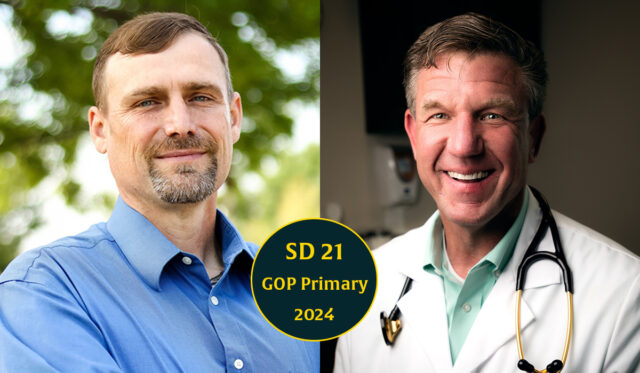

The Republican primary ballot for State Senate District 21 in the Stillwater area features a doctor who admires the late U.S. Sen. Tom Coburn, a rancher with “out-of-the-box” ideas, and the name of a former agriculture educator who has ceased campaigning to endorse the doctor.
While Dr. Randy Grellner and James Winn both discussed a perceived “decline in our country” as reasons for entering the race, Grellner argued that he wants to push back against what he sees as federal government overreach, and Winn said he is running because he has many ideas to bring to the state Legislature.
“I’m more of an ideas-driven guy. To me, anybody can talk politics, and it’s kind of like the same talking points, but I have a lot of outside-the-box ideas that I come up with,” Winn said. “I’m really good at solving problems, so I think that would be the bigger distinction as in, to me, it seems Grellner — he doesn’t want to dive in and say, ‘This is what I’ll do.'”
To that end, Winn said he has ideas for judicial reform and providing better school lunches to students.
Grellner, meanwhile, said that while he does not differ much from Winn’s politics, his health care experience sets him apart when campaigning to join a State Senate largely devoid of medical experience.
“I have two clinics. One’s personally owned here — my own business here in Cushing, and then we have another clinic with Stillwater Medical Center,” Grellner said. “I’ve been here 23 years, and I have a track record of trying to do the right thing.”
The winner of the June 18 Republican primary will face Democrat Robin Fuxa — an Oklahoma State University literacy professor — in the November general election.
Covering parts of Creek and Payne counties — including most of Stillwater — Senate District 21 is open because Sen. Tom Dugger (R-Stillwater) decided not to seek reelection after serving two four-year terms.
“Serving in the Oklahoma Senate has been one of the greatest privileges of my life, and I am forever grateful to the citizens of District 21 for entrusting me to be their voice at the Capitol,” Dugger said in his September announcement. “When I was first elected to the Legislature, I told myself eight years would allow enough time to help make a positive difference in our district. Once I retire from office, I look forward to being able to spend time with my wife, Ann, on personal projects.”
Even before Dugger publicly declared he was not seeking reelection, rancher Kurt Murray announced his candidacy in June 2023. He filed for the seat in April but announced May 11 — after the official deadline to avoid being on the ballot — that he was “ceasing campaign operations” and endorsing Grellner.
“My political advisors have delivered the grim analysis: There is virtually no path to victory without waging a blistering and negative campaign,” Murray wrote on Facebook. “Mud-slinging goes against everything I am about, and I won’t do it. To do so would violate my biblical beliefs, insult my community, degrade my profession and lower my personal standards.”
With Murray out of the primary picture — except as a possible spoiler whose name on the ballot could prevent someone from winning outright June 18 — Winn and Grellner participated in a May 23 forum hosted by the Stillwater Frontier Rotary Club.
For the June 18 primary election, polls will be open from 7 a.m. to 7 p.m. Early voting is scheduled to take place June 13 through June 15.
‘What made me throw my hat in the ring’
Grellner, a rural doctor from Cushing, mounted a long-shot bid for the U.S. Senate in 2022, finishing sixth among 13 Republican candidates for the seat ultimately won by Sen. Markwayne Mullin. Grellner released an advertisement lampooning Mullin and other opponents, as well one criticizing former House Speaker T.W. Shannon specifically.
This time around, Grellner said he decided to run because of threats he perceived from COVID-19-era lockdowns and mask mandates, and he said he hopes to bring a doctor’s perspective to the Oklahoma State Senate.
“There’s no doctors in the Senate or the House, and I think they need to hear a voice from our standpoint,” Grellner said. “I’ve been interested in trying to serve this state or this country because I see the direction that we’re going in. At this point, (it) is not very favorable.”
Winn is a rancher and former oil pipeline worker from Mannford.
“I’m one of the people that’s getting taxed to death on my paycheck and everything else, and it’s looking like our quality of life here in America is definitely on the decline,” Winn said. “So that’s what made me throw my hat in the ring.”
If elected, Winn said one of the ideas he wants to implement is to create a partnership between local Oklahoma farmers and ranchers and schools to provide school lunches.
“I think we should basically contract with local farmers — with Oklahoma farmers — for all our food in our schools. We should be able to set out a contract and make the farmer get insurance in case it fails and falls apart, they still have the insurance to be able to provide other food,” Winn said. “But I think that process, instead of buying food in a bag, which is what [schools] are doing now, and just heating it up — it’s highly processed, and it’s just not healthy for our kids, and so I think that would be a good positive thing in Oklahoma because then it’s going to put money in our farmers’ pockets, which in turn will spend that money in our local communities.”
Winn also said he wants to restructure how Oklahoma Supreme Court justices are appointed to the bench. Currently, the governor picks from a list of three candidates chosen by the Judicial Nominating Commission.
“Our Supreme Court justices are not really chosen by we the people. It’s a private organization, the Bar Association — which is not government — gets to choose three candidates, and then those three candidates are put forward to the governor, and the governor gets to choose out of the three,” Winn said. “So, it’s kind of like what we’re seeing in a lot of political races where you’re just picking the best of the worst.”
While some of the 15 JNC members are chosen by the Oklahoma Bar Association, it also includes six gubernatorial appointments as well as one appointment from the speaker of the House and one appointment from the Senate president pro tempore.
Winn said he would like to see the JNC’s responsibility moved to the Senate.
A proposal to put the question of whether to scrap the Judicial Nominating Commission passed the Senate during this year’s legislative session but failed in the House of Representatives.
Grellner, for his part, said one of his top priorities if elected would be to increase oil and gas usage in the state.
“There is a war at this point in time in this country on agriculture and oil gas. The war is on fossil fuels, which will affect what you and I eat someday and what the cost of it is,” Grellner said. “I really think that we need to go back to the petroleum industry and talk to them about gross production tax and the kind of things we’re doing there, and why they’re not drilling as much here in Oklahoma, and how can we incentivize that.”




















